Pickleball is not just a fun and engaging sport; it is also a community activity that thrives on respect and sportsmanship. Understanding court etiquette is essential for creating a positive playing experience and fostering camaraderie among players.
This article delves into the fundamental rules of pickleball court etiquette, covering everything from basic guidelines for respectful play to the proper procedures for reserving courts. It also addresses how to navigate different skill levels, handle disputes gracefully, and show courtesy toward both opponents and teammates.
Whether you are a seasoned player or new to the game, mastering these principles will enhance your enjoyment and contribute to a vibrant pickleball community.
Understanding Pickleball Court Etiquette
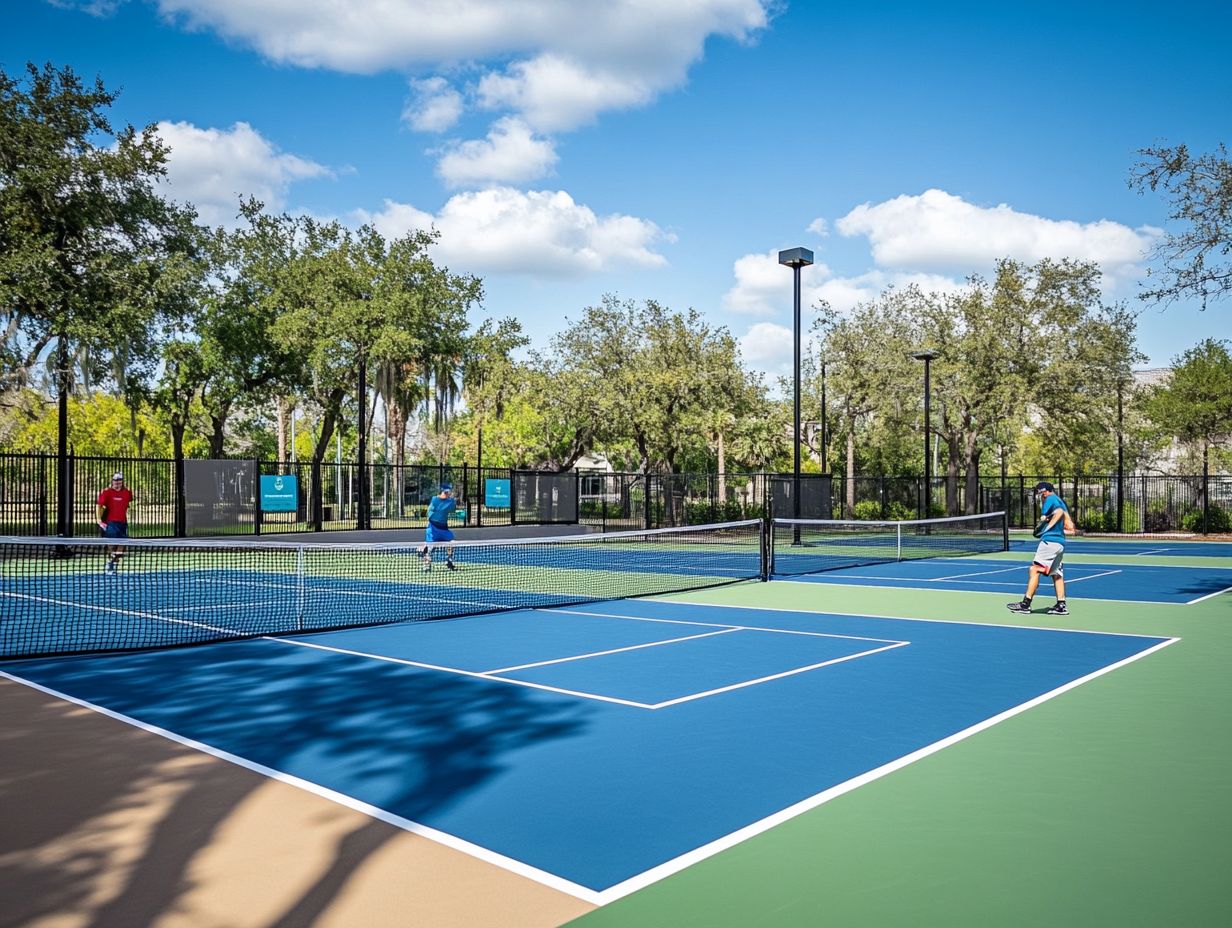
Understanding pickleball court etiquette is essential for fostering a positive environment during games and ensuring that all players can fully enjoy their experience. Pickleball court etiquette encompasses various aspects, including respectful play, player behavior, and sportsmanship.
Adhering to these guidelines not only enhances your own experience but also improves the experience for your fellow players and strengthens the pickleball community as a whole. Familiarity with court etiquette helps players navigate social interactions and the competitive nature of the game, while also minimizing the likelihood of friction and misunderstandings.
What is Court Etiquette and Why is it Important?
Court etiquette refers to the informal rules and guidelines that govern player behavior during a pickleball match, and it is essential for ensuring player safety and respectful play. These guidelines are important because they establish the tone of the match and help create a positive environment.
By understanding and adhering to these principles, players can enjoy the competitive nature of the sport while ensuring fair play and respect for their opponents. Observing proper court etiquette not only protects players from the risk of injury but also enhances the enjoyment of the game for everyone involved.
Furthermore, the importance of sportsmanship teaches players to appreciate good plays, communicate effectively, and minimize disputes, all of which contribute to a more pleasant atmosphere. Fostering a culture of respectful interaction within the pickleball community unites players as they work towards a common goal of mutual respect and sportsmanship.
Ultimately, following court etiquette ensures that every match is an enjoyable experience for all participants.
General Rules of Pickleball Court Etiquette
The fundamental rules of pickleball court etiquette dictate how players should behave, communicate, and show respect towards one another during the game. Adhering to these rules enhances the experience for all participants and fosters sportsmanship and a sense of community.
By promoting fairness and courtesy, these guidelines help prevent conflicts and miscommunications on the court.
Basic Guidelines for Respectful Play
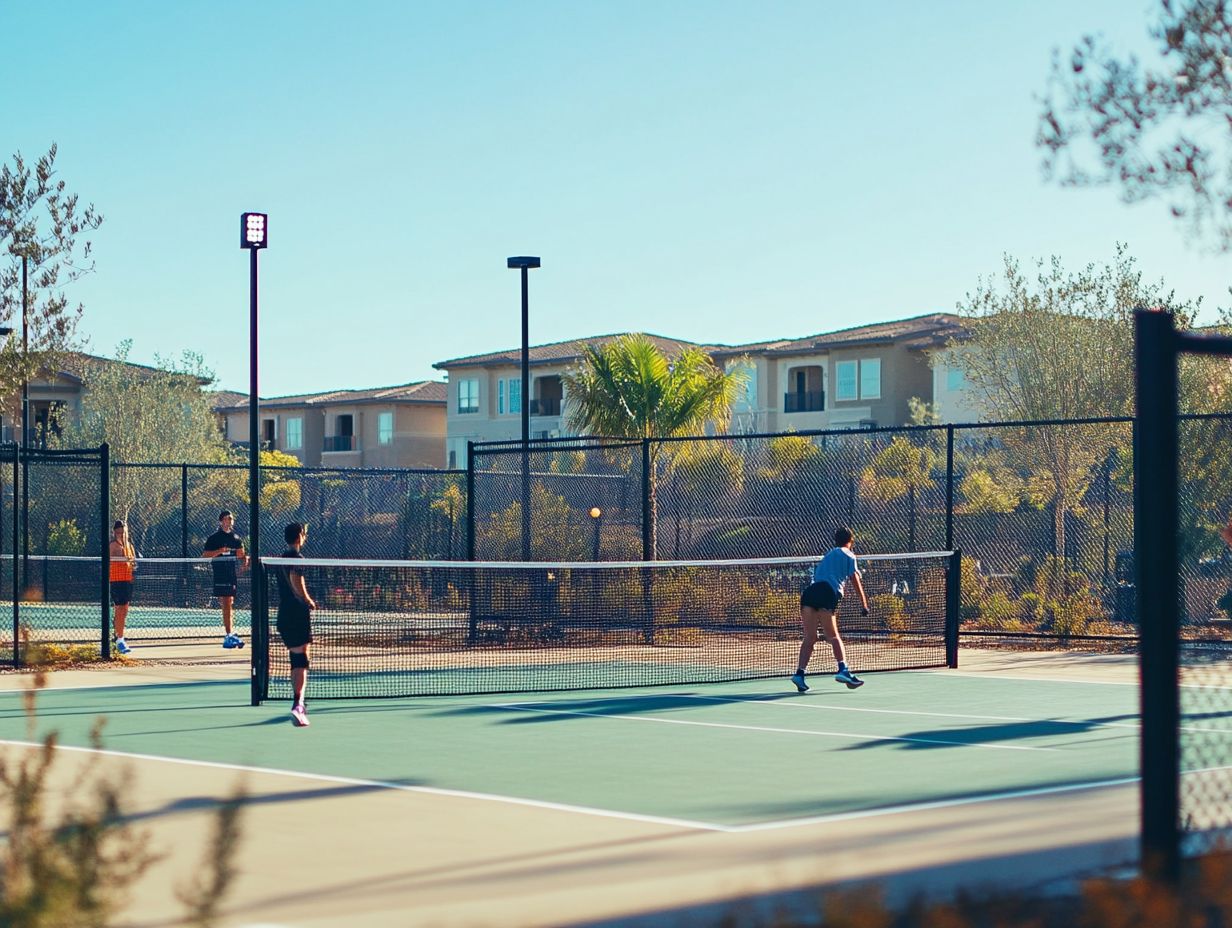
Broadly speaking, the fundamental guidelines for respectful play in pickleball aim to create an enjoyable and fair playing atmosphere. These rules address reasonable noise levels, considerations for game interruptions, and the importance of showing respect to opponents throughout the game.
Adhering to these guidelines for sportsmanship will not only enhance individual conduct in pickleball but also improve the overall atmosphere of the game.
Key points to consider include:
- Players should be mindful of the court lines and strive to keep their shots within those boundaries to avoid unnecessary disputes.
- Players must respect personal space by not crowding around their opponents, allowing everyone the freedom to play comfortably.
- Players should familiarize themselves with the scoring system since they are responsible for tracking points and the order of service.
- Players must refrain from unsportsmanlike conduct, as arguing with referees or displaying frustration can disrupt the flow of the game.
- Players should aim to maintain a good pace and positive atmosphere throughout the match.
Reserving and Sharing the Court
Reserving and sharing the court involves the etiquette of ensuring that the facility is used efficiently, allowing everyone an opportunity to play and enjoy the game. Proper etiquette in this regard includes communicating with other players about court availability and adhering to previously arranged schedules for court use.
By respecting the time and space of fellow players, participants can foster a cooperative environment that enhances the enjoyment and involvement of everyone within the pickleball community.
Proper Etiquette for Reserving and Rotating Courts
Proper etiquette for reserving and rotating courts in pickleball involves treating fellow players with respect and ensuring equitable access to play. This includes clear communication regarding court reservations, adherence to the schedule, and respectful interactions with opponents and fellow players. Following proper etiquette fosters mutual respect and contributes to a more organized and orderly playing environment.
Pickleball Etiquette for Fairness in Scheduling:
Establishing proper etiquette for reserving and rotating pickleball courts is essential for ensuring fairness in scheduling, which allows everyone the opportunity to play. This can be achieved by implementing a systematic approach to scheduling that considers the needs of all players. If conflicts arise, they should be resolved through respectful and constructive dialogue to reach a solution that everyone can agree upon, whether it involves rotating times or shortening match lengths.
Pickleball Etiquette for Proper Player Conduct:
As pickleball is a social game, proper etiquette also requires players to exhibit good conduct. This means recognizing the skill levels of others and playing with a spirit of sportsmanship. Such behavior fosters a friendly atmosphere rather than a purely competitive one.
Pickleball Etiquette for Coordinating with Fellow Players:
Effective etiquette in reserving and rotating pickleball courts also entails proper coordination with fellow players. This ensures that everyone is aware of the rotation system, allowing games to proceed smoothly and efficiently without infringing on the rights and time of others.
Playing with Different Skill Levels
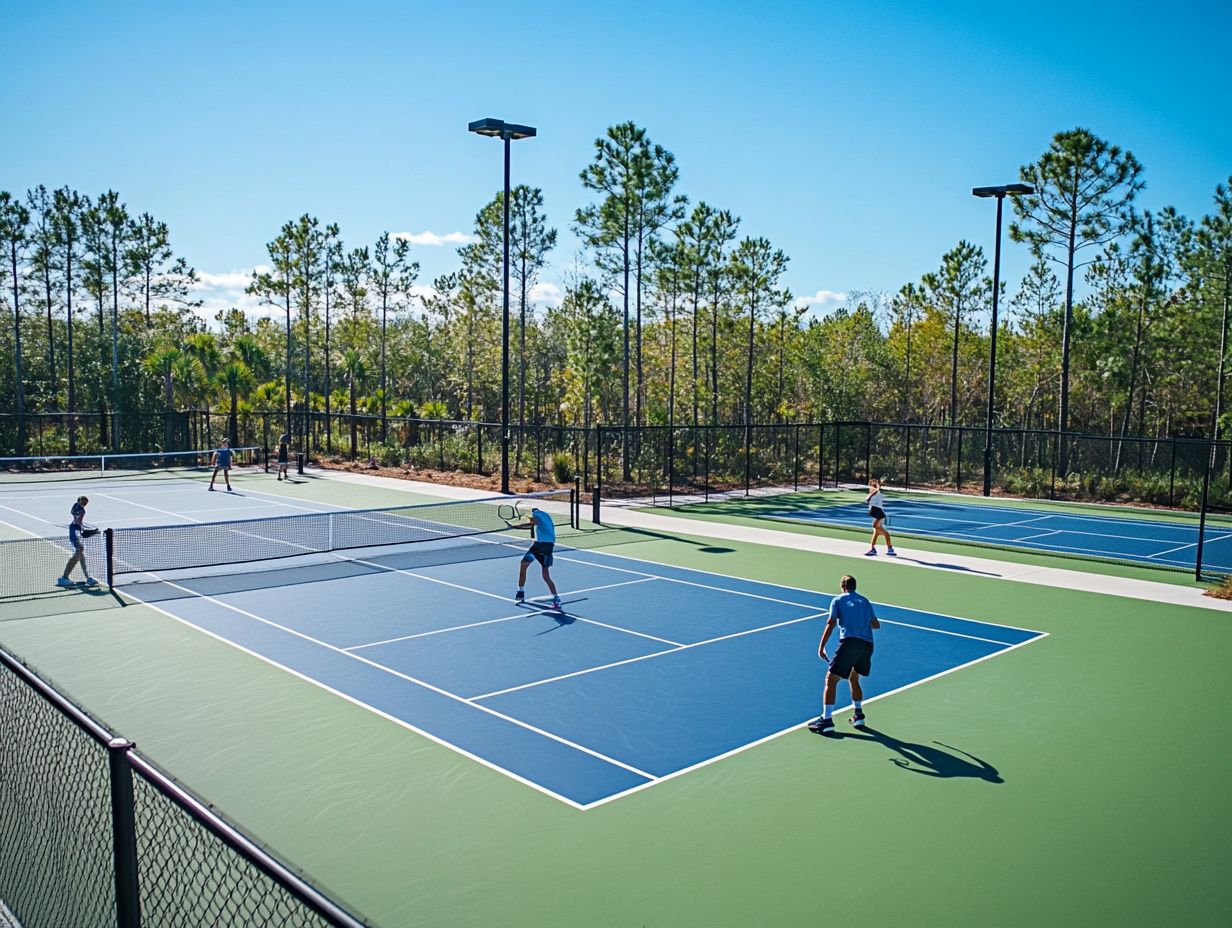
Competing with players of varying skill levels in pickleball can be a rewarding experience that fosters teamwork and enhances the game for everyone involved. It is essential to adjust your strategies according to the different skill levels, whether you are a beginner or an advanced player.
Embracing skill level diversity promotes personal growth and enhances the overall enjoyment of the game, while also strengthening camaraderie within the pickleball community.
Tips for Playing with Players of Different Skill Levels
To enhance your pickleball experience when playing with players of varying skill levels, consider the following tips: effective communication, game modification, and fostering an inclusive environment. By implementing these strategies, playing with opponents of different abilities can be more enjoyable and rewarding for everyone involved.
The first step in creating an inviting environment for all skill levels is through effective communication. Before starting the game, it is essential to discuss expectations and preferences with your opponents. For instance, if you prefer a more competitive match, make sure to communicate this beforehand.
The second strategy is to modify your game to accommodate players of different abilities. This approach not only enhances the experience for less skilled players but also encourages higher-skilled players to further develop their own abilities.
Thirdly, fostering an inclusive environment is crucial. One effective way to achieve this is by adjusting the pace of play. Slowing down the game allows less experienced players to gain confidence while still maintaining a competitive spirit. Additionally, sharing advanced strategies with lower-skilled players can help everyone improve their skills collaboratively.
Providing constructive feedback is another way to enhance the experience when playing with varying skill levels. It is important to frame feedback positively, starting with what the player did well before offering suggestions for improvement.
Ultimately, the key to creating a pleasant atmosphere for players of different skill levels in pickleball is to emphasize respect for all participants. By following these recommendations, you can help cultivate a welcoming community that benefits players at every level.
Handling Disputes and Conflict on the Court
Disputes and conflicts among players on the court are best managed through effective communication to resolve disagreements. Whether the issue involves a disputed score or a misunderstanding of the game rules, clear communication can facilitate resolution.
Employing conflict resolution techniques and fostering positive interactions among players can help minimize interruptions during the game, ensuring an enjoyable and uninterrupted pickleball experience.
Effective Communication and Conflict Resolution
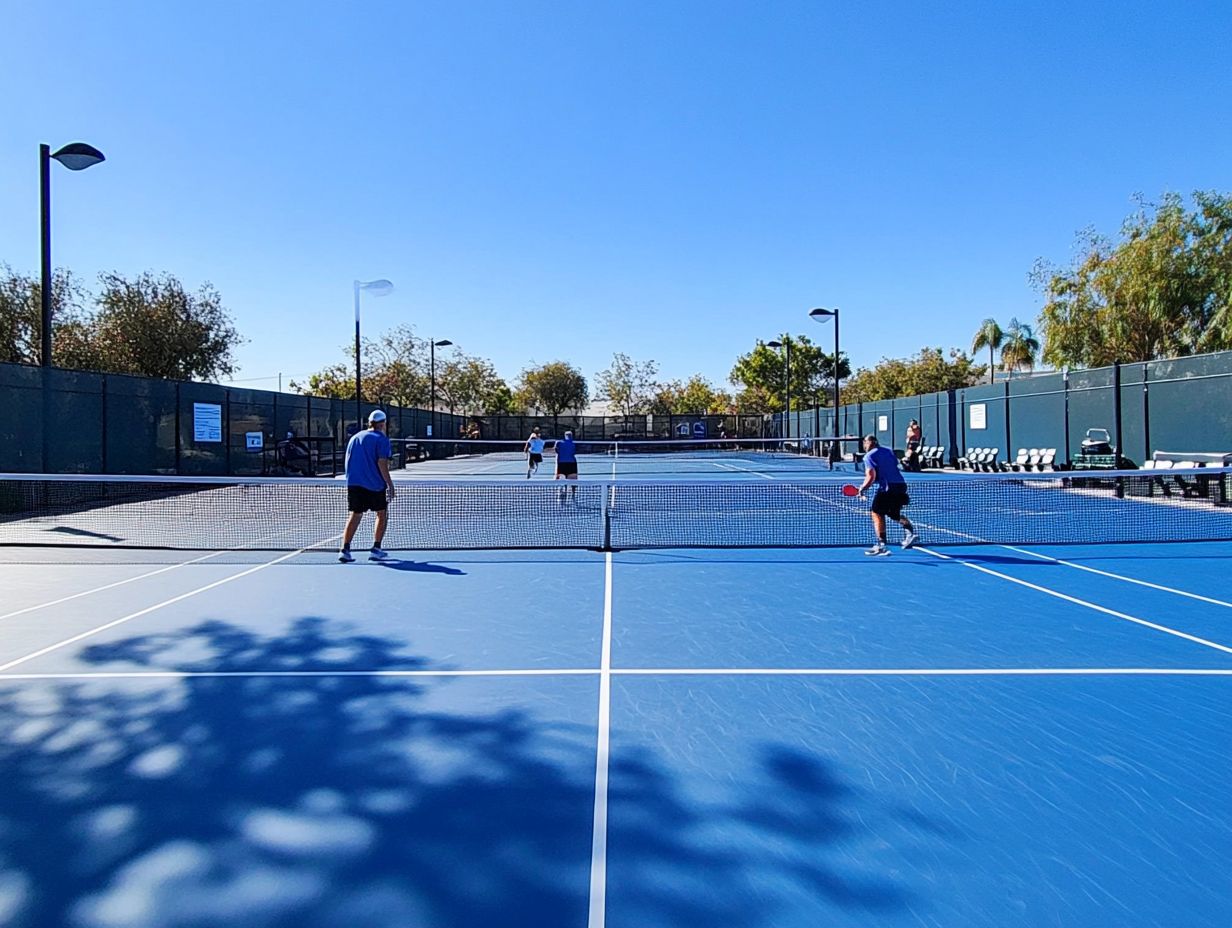
Effective communication and conflict resolution are essential for maintaining a positive playing environment in pickleball. Players should strive to listen and speak clearly to resolve misunderstandings and disagreements more effectively. By valuing respect and demonstrating good sportsmanship, they can contribute to a more enjoyable experience for everyone involved.
Several specific techniques can enhance communication among players. For example, using clear signals and gestures to convey intentions can facilitate smoother teamwork and coordination on the court.
Open-mindedness is also crucial, as players who welcome feedback from others can better understand how their playing style impacts their teammates. This openness can lead to improved teamwork as players adjust their games to accommodate one another’s styles.
Additionally, patience is vital during discussions about feelings, particularly in conflict resolution scenarios, as it allows conversations to unfold fully instead of jumping to conclusions. Lastly, fostering positivity through positive reinforcement can enhance teamwork; acknowledging small achievements can energize, motivate, and build camaraderie among team members.
Courtesy towards Opponents and Teammates
Courtesy toward opponents and fellow players is a fundamental aspect of pickleball, as it fosters friendly interactions and enhances the overall enjoyment of the game. This includes acknowledging good plays, offering encouragement, and maintaining a courteous demeanor at all times.
By adhering to these principles of sportsmanship, players will create an environment that encourages positive growth and enjoyment for everyone involved.
Showing Respect and Sportsmanship during Play
Respect and sportsmanship are fundamental requirements for healthy competition and the development of any sport. Good player conduct, game etiquette, and adherence to the rules all contribute to a positive experience and a culture of respect and fair play in pickleball.
Good sportsmanship is characterized by several key attributes, including the acknowledgment of an opponent’s skill and effort, regardless of the match outcome. Players who exhibit good sportsmanship understand that every game serves as a teaching moment for both themselves and their opponents, celebrating the skill of the rival whether they win or lose.
Additionally, winning and losing gracefully is essential. It is equally important for players of all skill levels to maintain a pace of play that is enjoyable for everyone involved. Those who embody proper sportsmanship will recognize this and ensure that the competitive spirit remains exciting while fostering an atmosphere of fun and camaraderie.
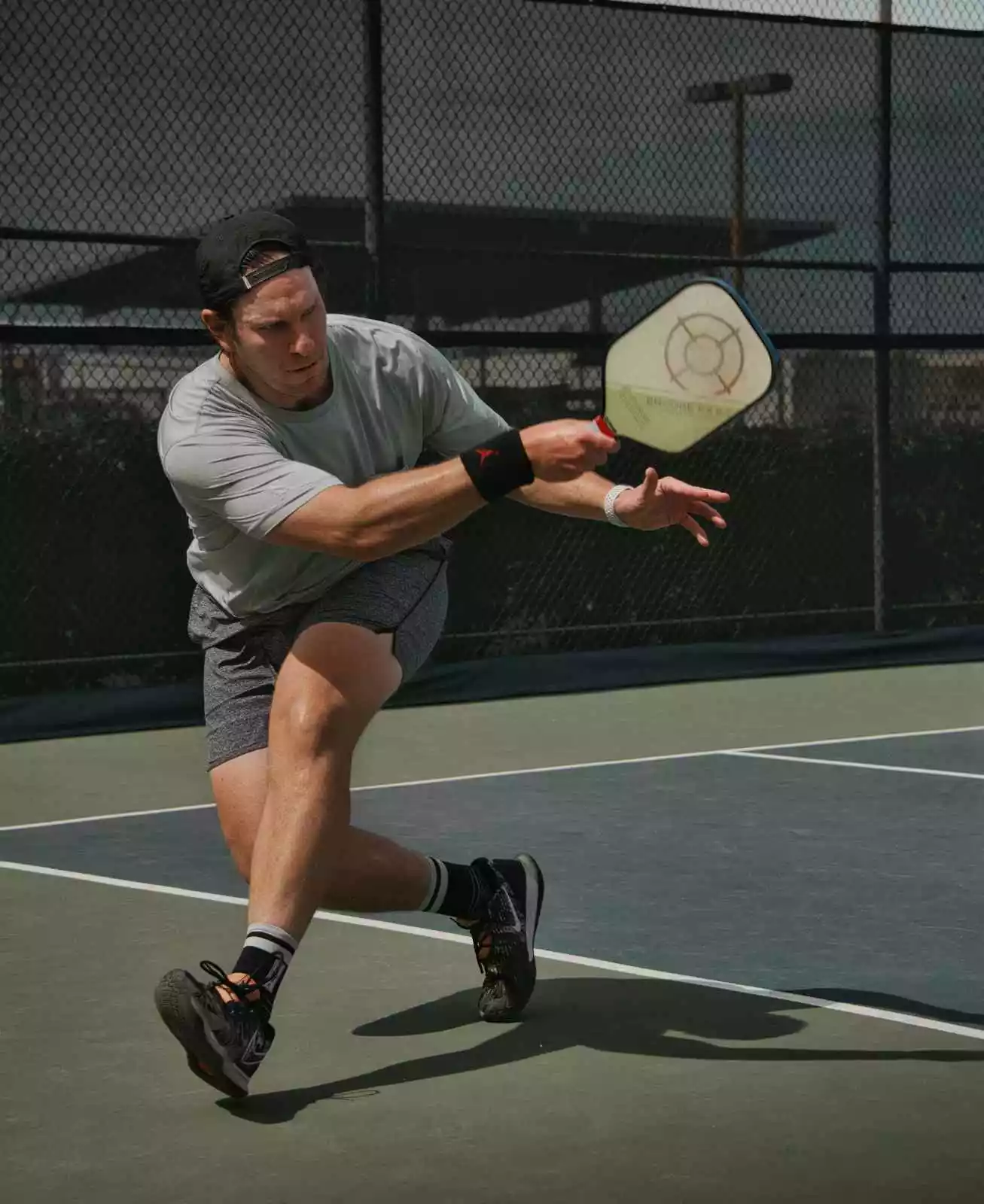
Pickleball’s more than a game to me—it’s a passion. I write, sharing its highs and lows, the thrills and the lessons. Some tales might draw you to the court, while others give a hint of the game’s magic. So, curious about my journey? Ready to dive deep into the world of pickleball with me? Let’s go.
